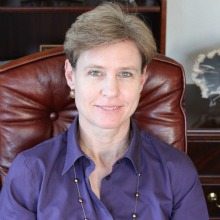
Tracy Hoffman is Founder & President of Science à la Carte, started in 2004 with a mission to promote scientific literacy and excellence through science enrichment, science education, and science training products for people of all ages.
Hoffman is an experienced educator herself, having spent nine years in the classroom teaching elementary and middle school students. She spoke with WashingtonExec about her current role, what made her choose STEM, what/who have been her influences since joining that field, ways to get excited about STEM, and more.
WashingtonExec: Tell us more about your background and your current role at Science à la Carte.
Tracy Hoffman: I received my B.A. and M.A. in Anthropology from UCLA, gradually shifting my focus from population genetics, to cytogenetics to molecular genetics. I conducted biological research in academic laboratories for 11 years before moving to a global biotechnology company, where I established and managed a training department. In 2004, I founded Science à la Carte, with the mission of promoting scientific literacy through education. Science à la Carte provides classroom workshops and science kits for grades K-8 as well as training consultation for biotechnology companies.
WashingtonExec: When did you first get interested in STEM and why?
Tracy Hoffman: I attended an all-girls Catholic high school where math and science took a back seat to the humanities.
_____________________________________________________________________________________________
“When a teacher told me that I didn’t have to worry about learning calculus, because I wouldn’t need it once I got married, my blood boiled. I was outraged that intellectual curiosity should be constrained by gender.”
_____________________________________________________________________________________________
In college, I was mentored by several wonderful professors, who taught me the value of meaningful STEM education. Once I had my own children, I quickly realized the uneven quality of STEM education at the elementary school level. I began to volunteer my time to teach science in their classrooms, providing hands-on, interactive and open-ended inquiry opportunities for the students.
WashingtonExec: Who has had the most influence on you on STEM and why?
Tracy Hoffman: My perspectives on STEM education have been deeply influenced by years of interactions with elementary school teachers who have explained their concern that science is being squeezed out of the curriculum as a result of the “No Child Left Behind” policy. I witnessed first-hand the struggles faced by my own children’s elementary teachers in trying to teach science in an engaging manner, when the vast majority of instructional minutes were already allocated to language arts, social studies and math. Other elementary teachers confided in me their insecurities in teaching science because it “is an intimidating subject” and their discomfort in relying too heavily on dry readings of the textbook followed by completion of worksheets. Elementary teachers play a vital role in STEM education because they lay the foundation for scientific literacy and often determine whether students’ attitudes toward science are positive or negative. It is vital that elementary school teachers have the skills and tools necessary to actively engage students in STEM topics and nurture the natural problem-solving skills of all children.
WashingtonExec: What advice would you give young girls who have an interest in STEM?
Tracy Hoffman: Follow your interests wherever they lead and seek out supportive teachers and mentors. Don’t be afraid to try new and unfamiliar things. It is only through trial and error that we begin to discover what we truly enjoy and it is through novel experiences that we discover hidden talents and passions. Read widely and take advantage of local science, engineering and technology resources such as museums, colleges and companies. Apply for STEM-oriented volunteer opportunities and internships. Above all, follow your passion!
WashingtonExec: What will your company look like in 3 years?
Tracy Hoffman: I hope to expand my company in the next three years to include elementary school teacher training workshops and to offer online training options. With our public schools’ implementation of Common Core and Next Generation Science Standards, it is vital to provide resources for teachers to develop their ability to provide project- and experiment-based STEM education that both seamlessly integrates with other subjects and allows students to creatively explore and solve problems with real-world applications.
WashingtonExec: Whom do you admire in STEM and why?
Tracy Hoffman: The late Sally Ride is someone I greatly respect, in part for her ground-breaking career, in part for her skill and intelligence, but also because of her well-rounded character; at Stanford she double-majored in both English and Physics. I have always admired people who explore a wide variety of subjects and who embrace interdisciplinary approaches to life.
_____________________________________________________________________________________________
“My admiration for Sally Ride only increased in 2001, when she established her own science education company, Sally Ride Science, which not only provides fantastic educational programs for both teachers and students, but also sponsors numerous events to encourage girls and young women to pursue STEM careers.”
_____________________________________________________________________________________
WashingtonExec: What advice would you give parents to get their kids to be excited about STEM?
Tracy Hoffman: Show them your interest and excitement in the world around you. When they ask you a question to which you don’t know the answer, don’t be afraid to admit “I don’t know”. But, don’t leave it at that. Discuss with your child how the two of you might find out the answer to the question. Try your own experiments or designs, and don’t worry if they don’t work out exactly as planned; that’s the fun and creative part of STEM. Every failure leads you closer to a fruitful solution. STEM is a process, not fixed content. Marvel at the world around you and allow your child opportunities to explore it.


